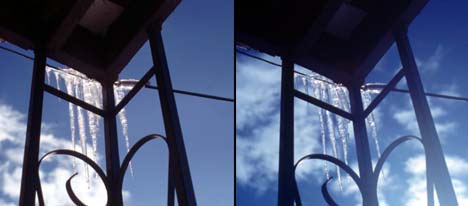Filter (photography)
|
|
In photography, a filter is a camera accessory consisting of an optical filter that can be inserted in the optical path. The filter can be a square optical glass mounted on a holder accessory; or (more commonly) a glass or plastic disk with a metal or plastic ring frame, which can be screwed in front of the lens.
Filters are commonly used in black and white photography to manipulate image contrast. For example a yellow filter will enhance the contrast between clouds and sky by darkening the latter. Orange and red filters will have a stronger effect.
El_Gouna_Egypt_BW_Filter_Comparison_EN.png
Filters are less common in color photography (and even less in digital photography). A major use is to compensate the effects of lighting not balanced for the film stock's rated color temperature (usually 3200K for professional tungsten lights and 5500K for daylight): e.g., the 80A blue filter used with daylight film corrects the orange/reddish cast of household tungsten lighting, while the 85 used with tungsten film will correct the bluish cast of daylight. Color correction filters are identified by numbers which sometimes vary from manufacturer to manufacturer.
The negative aspects of using filters, though often negligible, include the possibility of loss of image definition if using dirty or scratched filters, and loss of some exposure. The former is best avoided by careful use and maintenance of filters, while the latter usually will not be a problem if planned out properly.
Filters can be used also for special effects. A diffusion filter softens subjects and generates a dreamy haze; it can be improvised by smearing Vaseline on an UV filter.
Filter types
See also Filter (optics)
- Infrared
- ND filter
- UV
- monochromatic
- polarizer
- Contrast enhancement
- Color correction
- Special effects
- diopter
See also: List of photographic equipment makers
External links
- Photography Filters (http://www.photographycorner.com/photography-filters.php)

